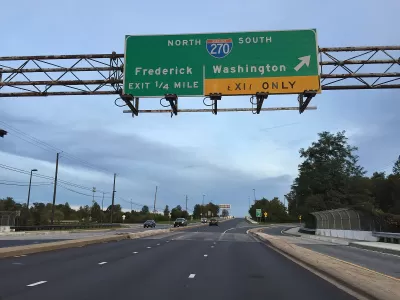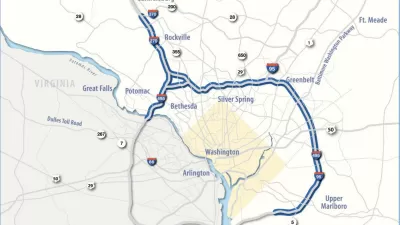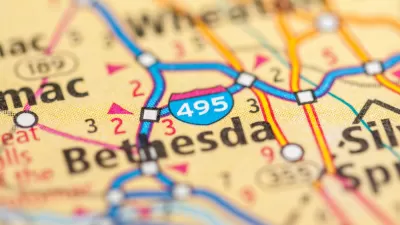The state transit authority has granted preliminary approval to the revised plan to expand the Capital Beltway and add new high-occupancy and toll lanes.

"The Maryland Transit Authority Board granted preliminary approval Tuesday to an amended project that will expand the Beltway around the American Legion Bridge" and "add two high-occupancy toll managed lanes in each direction on the bridge from I-270 to I-370 in the northern region," writes Dominique Maria Bonessi for DCist. "The project would also expand a 12-mile stretch on I-270 from the American Legion Bridge through Gaithersburg. Unlike previous iterations of the Beltway expansion plan, the current proposal does not include the eastern portions of the Beltway in Montgomery and Prince George’s counties."
After releasing a draft Environmental Impact Assessment last year, the agency scaled back the project in May 2021 after "months of opposition from local officials, residents and environmental advocates." The proposal "thas faced numerous criticisms in recent years, as the project worked through its draft environmental impact statement and went out to bid," including "concerns about uncertain environmental impacts, a lack of transit plans in the project, and the potential failure of another public-private partnership."
Director of the Maryland Department of Transportation and chair of the transit board Greg Slater "told board members in a virtual meeting that the current project does not displace any properties, exists mostly within its current footprint, and increases the throughput of cars in 2045 by up to 50%."
FULL STORY: Maryland’s Transit Authority Grants Preliminary Approval To Amended Beltway Project

Maui's Vacation Rental Debate Turns Ugly
Verbal attacks, misinformation campaigns and fistfights plague a high-stakes debate to convert thousands of vacation rentals into long-term housing.

Planetizen Federal Action Tracker
A weekly monitor of how Trump’s orders and actions are impacting planners and planning in America.

San Francisco Suspends Traffic Calming Amidst Record Deaths
Citing “a challenging fiscal landscape,” the city will cease the program on the heels of 42 traffic deaths, including 24 pedestrians.

Defunct Pittsburgh Power Plant to Become Residential Tower
A decommissioned steam heat plant will be redeveloped into almost 100 affordable housing units.

Trump Prompts Restructuring of Transportation Research Board in “Unprecedented Overreach”
The TRB has eliminated more than half of its committees including those focused on climate, equity, and cities.

Amtrak Rolls Out New Orleans to Alabama “Mardi Gras” Train
The new service will operate morning and evening departures between Mobile and New Orleans.
Urban Design for Planners 1: Software Tools
This six-course series explores essential urban design concepts using open source software and equips planners with the tools they need to participate fully in the urban design process.
Planning for Universal Design
Learn the tools for implementing Universal Design in planning regulations.
Heyer Gruel & Associates PA
JM Goldson LLC
Custer County Colorado
City of Camden Redevelopment Agency
City of Astoria
Transportation Research & Education Center (TREC) at Portland State University
Jefferson Parish Government
Camden Redevelopment Agency
City of Claremont




























